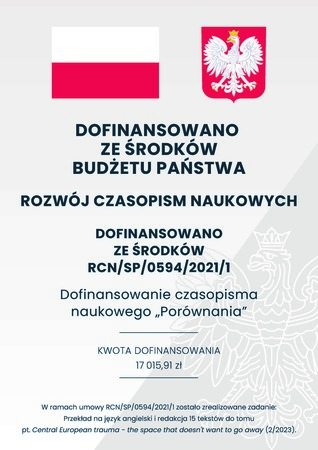Trenutna številka
"Porównania” has been published annually since 2004 and biannually since 2011. It includes original works and translations of comparative research within literary studies, theory and history of culture, theory of science, anthropology, art study, the cinema, music but also comparative research on history, postcolonial studies, gender, pedagogy, law, contemporary media and the relationship between the humanities and natural sciences. There are also polemics, reviews, surveys of comparative works and a list of received books.
INDEXED IN:
SCOPUS, ERIH Plus, Index Copernicus, ROAD, THE KEEPERS, CROSSREF, WIKIDATA, SUDOC, EZB, SHERPA ROMEO
JOURNAL METRICS:
Ministry of Education and Science (2024): 100
DOI: 10.14746/p
ISSN: 1733-165X
e-ISSN: 2956-6169
This work is licensed under a Creative Commons Attribution-NoDerivatives 4.0 International License
DATA ARCHIVING
The PRESSto platform digitally preserves the content of this journal using the PKP Preservation Network (PKP PN), which provides digital long-term preservation of data and secured access to the content of the journal.
The journal "Porównania" complies with the I40C standards for open citations.
PUBLISHER
Adam Mickiewicz University in Poznań
FUNDING

Obvestila
Call for papers
We cordially invite submissions of article proposals for the upcoming issue of Porównania (2026/2), dedicated to the theme "The Year 1956."
Več…

